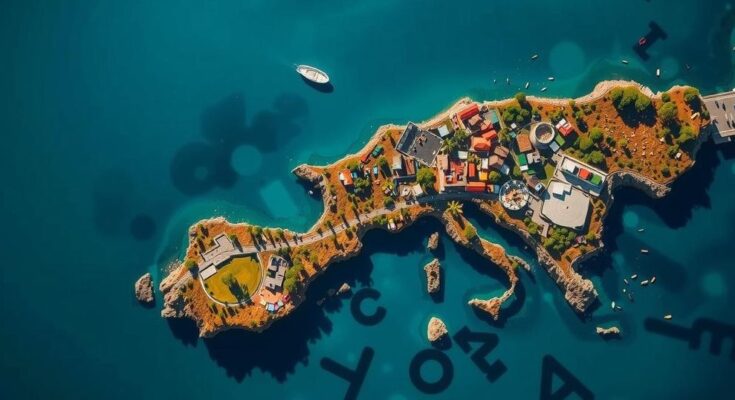Sardinia is actively pursuing a green energy transition in response to climate challenges, leading to a significant push for local governance over energy projects. President Alessandra Todde’s administration has rejected numerous large-scale private energy proposals due to concerns about environmental and cultural impacts, sparking court disputes with the Italian government. This struggle reflects the island’s commitment to preserving its heritage while navigating modern energy demands, engaging the community in sustainable practices.
In the picturesque town of Gavoi, Sardinia, energy management is increasingly focused on sustainability, as evidenced by the projection of carbon reduction statistics from solar panels in municipal buildings. As climate advocates gather for COP29 in Baku, Sardinian President Alessandra Todde emphasizes the region’s commitment to addressing the climate crisis through cooperative action within the Mediterranean. Sardinia, an autonomous region of Italy, has sought to redefine its climate policy amidst conflicts with the Italian government over the regulation and implementation of private energy projects.
In a recent demonstration, over 210,000 Sardinians rallied in Cagliari supporting the ‘Pratobello 24’ initiative, which seeks to restore local governance over urban planning and renewable energy projects. President Todde stated decisively, “Sardinia, like it or not, will not accept to passively suffer decisions made from above,” referencing the ongoing conflict with Prime Minister Giorgia Meloni’s administration. This resistance is indicative of a broader trend of local activism observed across the globe, where communities demand more say in their energy policies.
Recognizing the urgency of their situation, the Sardinian regional government has suspended numerous large-scale renewable projects initiated under the previous administration. This decision has met with fierce opposition from the Italian government, prompting a legal battle over Sardinia’s jurisdiction in energy matters. Nevertheless, Todde’s government continues to shape a legislative framework for responsibly managing renewable energy development, an effort that encourages active participation from local communities while preserving Sardinia’s rich cultural and environmental heritage.
As Sardinia grapples with the threats of environmental degradation and cultural loss, there is a growing sentiment among residents that the transition to green energy must not repeat the mistakes of corporate exploitation observed in the past. The cultural resurgence on the island is bolstered by various social movements, drawing parallels to historic uprisings against external control. This collective awakening is fostering an environment where local traditions intersect with innovative climate action strategies, positioning Sardinia as a potential leader in sustainable development within Italy and Europe.
Unfortunately, the island is at risk of losing significant archaeological and cultural sites to the encroachment of wind and solar projects, provoking fear and resistance among its inhabitants. Activists assert that the energy transition must prioritize Sardinia’s identity, as historical narratives are intertwined with present-day struggles against industrial exploitation. By invoking the legacy of Sardinia’s past, a renewed vision for its future is emerging — one that harmonizes ecological sustainability with cultural preservation.
As the island stands at a crucial crossroads, leaders within the Sardinian government and local communities advocate for a green revolution that is equitable and respectful of the region’s heritage. With ongoing legal disputes set to shape its energy future, Sardinia’s fight for autonomy and climate action serves as a powerful example for regions worldwide seeking to navigate the complex intersection of development, cultural identity, and environmental stewardship.
This article discusses the ongoing environmental and political situation in Sardinia, an autonomous Italian region striving for greater control over its energy policies. The recent protests against large-scale renewable energy projects initiated under previous national policies reflect the local population’s desire to reclaim jurisdiction over urban planning and environmental conservation. The piece highlights the emerging cultural revival among Sardinians who see their ancient history as a guide for modern climate action.
Sardinia’s struggle for autonomy over its energy future exemplifies a broader movement for local empowerment in climate action. As tensions rise between the regional government and the Italian administration, Sardinians are advocating for a balanced approach to renewable energy that honors their cultural and environmental legacy. The ongoing legal battles will ultimately determine the island’s direction in this crucial fight, positioning Sardinia as a potential climate leader with lessons for regions around the world.
Original Source: www.salon.com




